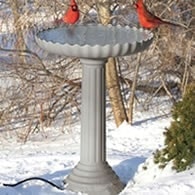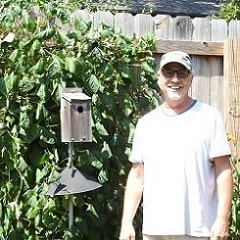Keeping Bees Off Hummingbird Feeders - Tips and Techniques
It's always fun each spring to see those first hummingbirds arrive and start feeding from our feeders. What a privilege it is to have them in our gardens or backyards.
However, sometimes bees can also be attracted to hummingbird feeders, competing with the hummingbirds for the nectar and causing a nuisance.
If you are experiencing issues with bees swarming around your hummingbird feeders, fear not!
In this article, we will explore several effective ways for keeping bees off hummingbird feeders, allowing you to enjoy the beauty of hummingbirds without the unwanted presence of bees.

Choose the Right Type of Feeder
Selecting the right type of feeder can make a significant difference to deterring bees from your hummingbird feeders.
Avoid feeders with large openings or wide perches, as these can easily accommodate bees.
Opt for feeders with small openings and no perches, as they are designed to be accessed only by hummingbirds, whose long bills and tongues are perfectly suited for the task.
Look for feeders with bee guards or built-in ant moats, which can prevent bees from gaining access to the nectar.
Opt for Red or Orange Feeders
Bees are often attracted to the color yellow, as it resembles flowers they typically feed on.
By choosing a hummingbird feeder in red or orange colors, you can potentially deter bees from approaching the feeder.
Hummingbirds, on the other hand, are highly attracted to red and orange hues, making these colors an excellent choice for attracting them to your feeder.
Consider replacing yellow feeders with red or orange ones to minimize bee activity.
Place Feeders in the Right Location
The location of your hummingbird feeders can also play a role in deterring bees.
Avoid placing feeders near flowers or plants that attract bees, as this may encourage bees to visit your feeders as well.
Instead, choose a location that is open and away from flowering plants, reducing the chances of bees being drawn to the area.
Hang the feeders in a shaded spot, as bees are less likely to be attracted to shaded areas.
Keep Feeders Clean and Leak-Free
Leaking feeders can quickly attract bees, as they are highly skilled at detecting nectar from a distance.
Regularly clean your hummingbird feeders to prevent the buildup of residue that can attract bees.
Rinse the feeders with hot water and a mild detergent, making sure to remove all traces of sugar water.
Inspect the feeders for any leaks or cracks and replace or repair them as needed to ensure they are not dripping nectar that could attract bees.
Limit the Amount of Nectar
Bees are attracted to high concentrations of sugar, so consider reducing the amount of nectar in your feeders.
Fill the feeders with just enough nectar to last for a day or two, as excessive nectar can attract not only bees but also other insects.
Avoid using nectar with a higher sugar content, as it may be more appealing to bees.
A typical hummingbird nectar recipe consists of one part sugar to four parts water, but reducing the sugar to a 1:5 ratio may help deter bees while still providing enough energy for the hummingbirds.
One of the benefits of reducing the ratio a bit is that studies show hummingbirds make more visits to the feeders!
Just don't go too low, keep to the 1:5 ratio.
Use Guards
Bee guards are small mesh screens or plastic barriers that can be added to hummingbird feeders to prevent bees from accessing the nectar.
These guards have small openings that are too narrow for bees to pass through, but large enough for hummingbirds to feed comfortably.
Many hummingbird feeders come with built-in bee guards, or you can purchase them separately and attach them to your feeders.
Once again, choose bee guards that are not yellow. If you have yellow guards, find a non-toxic paint to color them with.
Offer Bees Their Own Source
Offering bees their own feeder of nectar in a shallow saucer may help draw them away from your other feeders.
Place this saucer out in the sun some distance away from all the other feeders you may have around.
Keep it cleaned and filled with fresh nectar as often as needed. After all, we do want the bees around.
Bees drink water too. They need water to thin the honey. A small dish with some pebbles and water may do the trick.
Conclusion
No one can guarantee a way for keeping bees off hummingbird feeders that are placed outside. Nature does what it wants.
However, giving these tips and techniques a try may give you and your hummingbirds a little peace of mind.
Now, what are we going to do with all the other Birds that Come to Hummingbird Feeders?



